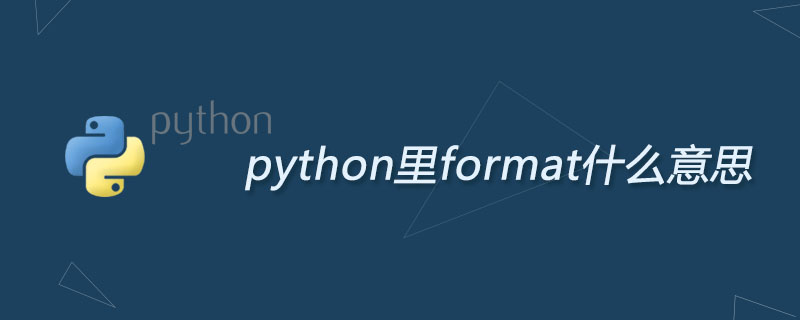Heim >Backend-Entwicklung >Python-Tutorial >Was bedeutet Format in Python?
Was bedeutet Format in Python?
- (*-*)浩Original
- 2019-06-25 10:33:1116863Durchsuche
format ist eine neue Methode zum Formatieren von Zeichenfolgen in Python 2.6. Im Vergleich zur alten Version der %-Formatierungsmethode bietet sie viele Vorteile.

1. In der %-Methode kann %s nur den String-Typ ersetzen (empfohlenes Lernen). : Python-Video-Tutorial)
2. Ein einzelner Parameter kann mehrmals ausgegeben werden und die Reihenfolge der Parameter kann unterschiedlich sein
3. Die Füllmethode ist sehr flexibel und die Ausrichtung ist sehr leistungsstark
4. Die offiziell empfohlene Methode, die %-Methode, wird in späteren Versionen eliminiert
Ein Beispiel für ein Format
print 'hello {0}'.format('world')
Ausgabe:
hello world
Spezifischer Anwendungsfall:
#通过位置
print '{0},{1}'.format('chuhao',20)
print '{},{}'.format('chuhao',20)
print '{1},{0},{1}'.format('chuhao',20)
#通过关键字参数
print '{name},{age}'.format(age=18,name='chuhao')
class Person:
def __init__(self,name,age):
self.name = name
self.age = age
def __str__(self):
return 'This guy is {self.name},is {self.age} old'.format(self=self)
print str(Person('chuhao',18))
#通过映射 list
a_list = ['chuhao',20,'china']
print 'my name is {0[0]},from {0[2]},age is {0[1]}'.format(a_list)
#my name is chuhao,from china,age is 20
#通过映射 dict
b_dict = {'name':'chuhao','age':20,'province':'shanxi'}
print 'my name is {name}, age is {age},from {province}'.format(**b_dict)
#my name is chuhao, age is 20,from shanxi
#填充与对齐
print '{:>8}'.format('189')
# 189
print '{:0>8}'.format('189')
#00000189
print '{:a>8}'.format('189')
#aaaaa189
#精度与类型f
#保留两位小数
print '{:.2f}'.format(321.33345)
#321.33
#用来做金额的千位分隔符
print '{:,}'.format(1234567890)
#1,234,567,890
#其他类型 主要就是进制了,b、d、o、x分别是二进制、十进制、八进制、十六进制。
print '{:b}'.format(18) #二进制 10010
print '{:d}'.format(18) #十进制 18
print '{:o}'.format(18) #八进制 22
print '{:x}'.format(18) #十六进制12
Weitere technische Artikel zum Thema Python finden Sie in der Spalte Python-Tutorial, um mehr darüber zu erfahren!
Das obige ist der detaillierte Inhalt vonWas bedeutet Format in Python?. Für weitere Informationen folgen Sie bitte anderen verwandten Artikeln auf der PHP chinesischen Website!

